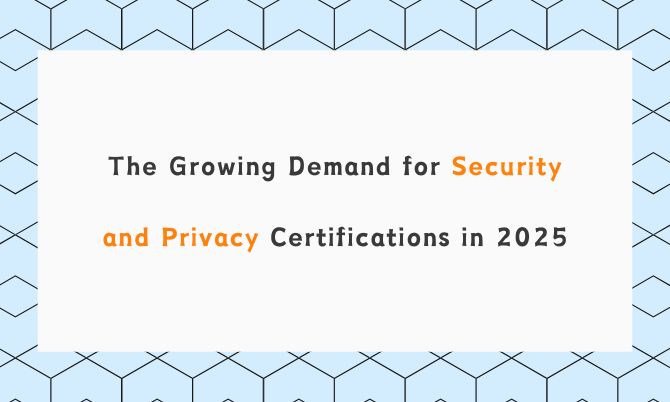As cyber threats become increasingly sophisticated and organizations face mounting pressure to protect their data and infrastructure, the demand for security and privacy certifications is set to rise significantly in 2025. These certifications are essential for IT professionals who want to stay ahead of the curve and prove their expertise in securing cloud environments, ensuring data privacy, and implementing advanced security strategies like zero-trust architectures.

The past few years have seen a surge in cyberattacks, ranging from data breaches to highly sophisticated ransomware attacks. In response, businesses are prioritizing cybersecurity more than ever, increasing their investments in both technology and skilled professionals. As a result, the demand for cybersecurity professionals has skyrocketed, with organizations seeking individuals who possess in-depth knowledge of security frameworks and best practices to safeguard their systems.
Security and privacy certifications are crucial for IT professionals to acquire and demonstrate the specialized knowledge required to protect sensitive data and ensure business continuity. Moreover, as organizations continue migrating to the cloud, the complexity of securing distributed systems escalates, making cloud security certifications particularly valuable.
The zero-trust security model, which operates on the principle of "never trust, always verify," has become a key strategy for organizations to protect their systems. Under this model, no user or device - whether inside or outside the organization - is trusted by default, and every access request must be authenticated and continually monitored.
As businesses move toward adopting zero-trust frameworks, the demand for professionals who can design, implement, and manage these models is growing. Certifications that focus on zero-trust principles, particularly within cloud environments, are expected to be increasingly sought after.
Prominent certifications in this area include the Certified Cloud Security Professional (CCSP), which covers cloud data security, identity management, and compliance. Additionally, Microsoft Certified: Security, Compliance, and Identity Fundamentals provides essential knowledge about cloud security, including zero-trust models.
In 2025, data privacy regulations such as the General Data Protection Regulation (GDPR) in the European Union and the California Consumer Privacy Act (CCPA) in the U.S. will continue to shape cybersecurity and privacy practices. With businesses facing increasing scrutiny to comply with these regulations, professionals with expertise in data protection and privacy management are in high demand.
Privacy and compliance certifications help IT professionals navigate the complex regulatory environment and ensure organizations remain compliant with privacy laws. The Certified Information Privacy Professional (CIPP), offered by the International Association of Privacy Professionals (IAPP), is one of the most respected privacy certifications, equipping professionals with a deep understanding of privacy regulations, policy, and governance.
In addition to CIPP, certifications like Certified Information Systems Security Professional (CISSP) and Certified Information Security Manager (CISM) have expanded their coverage to include privacy concerns, helping professionals manage privacy risks in cybersecurity environments.
Several certifications are expected to play a critical role in shaping the cybersecurity and privacy landscape in 2025:
Certified Information Systems Security Professional (CISSP): CISSP remains one of the most sought-after certifications in cybersecurity. It covers key areas like security architecture, risk management, and security operations, making it ideal for professionals pursuing roles as security consultants, architects, or managers.
Certified Cloud Security Professional (CCSP): With more businesses shifting to the cloud, cloud security remains a top priority. CCSP is a globally recognized certification that focuses on securing cloud environments, covering areas such as governance, risk management, and cloud-specific security controls.
Certified Information Privacy Professional (CIPP): For those specializing in data privacy, CIPP certifications are invaluable. As privacy regulations become more complex, professionals who can navigate these laws will be in high demand.
CompTIA Security+: A foundational certification in cybersecurity, Security+ covers essential security concepts, including network security, encryption, and identity management. It is an excellent starting point for individuals looking to break into the cybersecurity field.
Certified Ethical Hacker (CEH): As organizations strive to stay ahead of malicious hackers, ethical hacking and penetration testing are crucial for identifying and addressing vulnerabilities. CEH remains one of the most recognized certifications in this domain, teaching professionals to simulate cyberattacks to uncover security weaknesses.
As we move into 2025, the cybersecurity and privacy landscape will continue to evolve. With the rapid adoption of artificial intelligence (AI) and machine learning in cybersecurity, IT professionals will need to obtain certifications that address the unique challenges posed by these emerging technologies. AI-powered security solutions, including automated threat detection and response, will require professionals to understand how to leverage these tools while maintaining robust security and compliance.
Additionally, technologies like blockchain are starting to play a more prominent role in security, particularly in supply chain management and data integrity. Specialized certifications in these areas may become increasingly important as blockchain technology integrates more deeply into security practices.
Security and privacy certifications will continue to be an essential part of IT professionals' skill sets in 2025 as organizations face increasingly sophisticated cyber threats and complex regulatory requirements. With the rise of zero-trust models, a greater emphasis on privacy compliance, and a growing focus on cloud security, obtaining the right certifications is crucial for those looking to advance their careers in the cybersecurity and privacy fields.